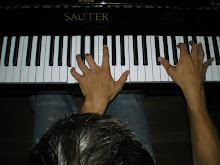Nice friends of mine have planned a little trip to keep me busy for the rest of spring break. Nowhere warmer, but i'll take it.
Well, this also means my time with the library cds is about at an end. This time around the Ades cd confirmed my previous summation of it- boring. Interesting sounds, interesting uses of the instruments, but nothing held my interest beyond that. and, no carols on this one - it was a lot of his earlier works, five elliot landscapes (i did like the bit about the mockingbird.) Catch, the first track on the disk was probably the most engaging, and had some beautiful moments and some fun parts, but i really wasnt taken by any of the other pieces, they all just blended together, indecipherable and nothing so new. The titles are great - Darkness visible, Still sorrowing, Under Hamelin Hill, Traced Overhead, but unfortunately, nothing really stood out about them. Its not that i dont like Ades, either, its just this disk doesnt have his best work on it.
The Walter Piston, on the other hand (Symphony #4) perhaps because i wasnt expecting so much, really pleased me. The symphony was energetic, interesting, mostly in the first half (the second half, not as much) but it sounded so incredibly american, its great. I wish i would have had time to give this mid-century tonal modernism more attention, but i had four CDs to cover.
And then the Micheal Nyman. The disk as a whole (Time Will Pronounce) wasnt that interesting, but it did have a great beginning. The first piece, Self-laudatory hymn of Inanna and her omnipotence, was fresh, vigorous, energetic and beautiful. The instrumentation consisted of viols and a countertenor who sings well beyond the range of any male i know. The music struck me as a post-modern Henry Purcell piece, the vocal writing shows a remarkable and wonderful similarity to purcell, and the piece as a whole is compelling, sweet and lyrical, just as Purcell would have it. The rest of it the disk was ok, but not that great, the start of For John Cage was good, but it rambled on and on. Same for the other two, though the rhythmic and tonal evolution in The convertibility of lute strings was fun and i liked the contrast between the contemporary minimalistic feel of music and the ancient sound of the harpsichord.
I already explained my enjoyment of the Machaut mass. But yep, thats my little overview-review. I still cant believe some stuffy, pompous ass art critic criticized Marc Geelhoed for using the word "cool". The use has nothing to do with selling something, but it does have everything to do with expressing ones self. I know i had something more to say, but i honestly dont remember it. Ah well, another time.
Lahti
2 years ago

No comments:
Post a Comment